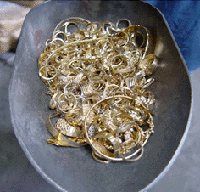By Julian D.W. Phillips | 29 February 2008
Gold and silver prices are at their peak and look as though they are going to go higher still. Both gold and silver prices have been rising steadily over the years despite there being both a surplus and, in the case of silver, government selling of stockpiles. This tells us that the potential as well as the past surpluses are far lower and far more difficult to access than one thinks. Why?
The prime overall reason is that statistics may show these figures but are these amounts really available in the market place? The surplus is an overall figure that may or may not reach the marketplace. Whatever the surplus is, it will appear steadily over the year, not at any one time such as the start point. The current gold & silver prices tell us that neither is available over and above current market demand, or the prices of both would not be rising. At best, the full real picture of the gold & silver markets is nigh on impossible to quantify accurately (including the gold and silver stored away from statisticians eyes). How much gold & silver will come off tables and arms and ears and go down to a scrap merchant (then to the refinery and then to the market and et cetera) cannot be measured.
Take the situation in India, where the silver and gold markets, we are told, are very quiet and have been for several months. There are huge volumes of gold & silver bought over the last few decades there, so why doesn't it leave the homes in which it is kept and travel to the market? Why don't merchants then take it in at the prices they offer, parcel it up and ship it to the international markets to get the apparent profit?
 In India, the main buyers of silver and gold [70%] are rural people, who do not suffer income tax on their farming income. When they sell their produce they are paid cash and don't generally have a bank account. Rather than keep this paper medium of exchange in their house, they take the money and buy gold and silver for cash, which then make up their savings. Over the last few years the rising prices of the two precious metals has confirmed the wisdom of such policies.
In India, the main buyers of silver and gold [70%] are rural people, who do not suffer income tax on their farming income. When they sell their produce they are paid cash and don't generally have a bank account. Rather than keep this paper medium of exchange in their house, they take the money and buy gold and silver for cash, which then make up their savings. Over the last few years the rising prices of the two precious metals has confirmed the wisdom of such policies.However, should the need arise for them to sell their gold and silver, they approach their dealer. When he buys, he has to report the transaction "officially" and pay purchase tax, which is enormous relative to his profits. He also would have to expose his complete business to the authorities, whose reputation for administering businesses is appallingly corrupt. Should he then want to export this purchased metal, he needs to reflect the metal in his accounts and confirm purchase tax has been paid. With a similar aversion to tax as one has to the plague, dealers buy such scrap for cash and hoard it in their own private, invisible stores. Then out of the sight of Indian authorities again, he will hedge his long position on the international exchanges through a short position, matching the long position he has, thus removing the price risk on the metal (all this done in a secretive manner).
 "There will be no exports of gold or silver from India!"
"There will be no exports of gold or silver from India!"Remarkably, NO gold or silver is exported from India, despite the invisible surplus. The only sign of it is in the short positions [Commercial] on international exchanges. Hoarding of gold and silver in India is huge, proven by the fact that none is exported. More to the point: None will be exported; no matter what the gold and silver prices go to!
ߧ
Normxxx
______________
The contents of any third-party letters/reports above do not necessarily reflect the opinions or viewpoint of normxxx. They are provided for informational/educational purposes only.
The content of any message or post by normxxx anywhere on this site is not to be construed as constituting market or investment advice. Such is intended for educational purposes only. Individuals should always consult with their own advisors for specific investment advice.

No comments:
Post a Comment